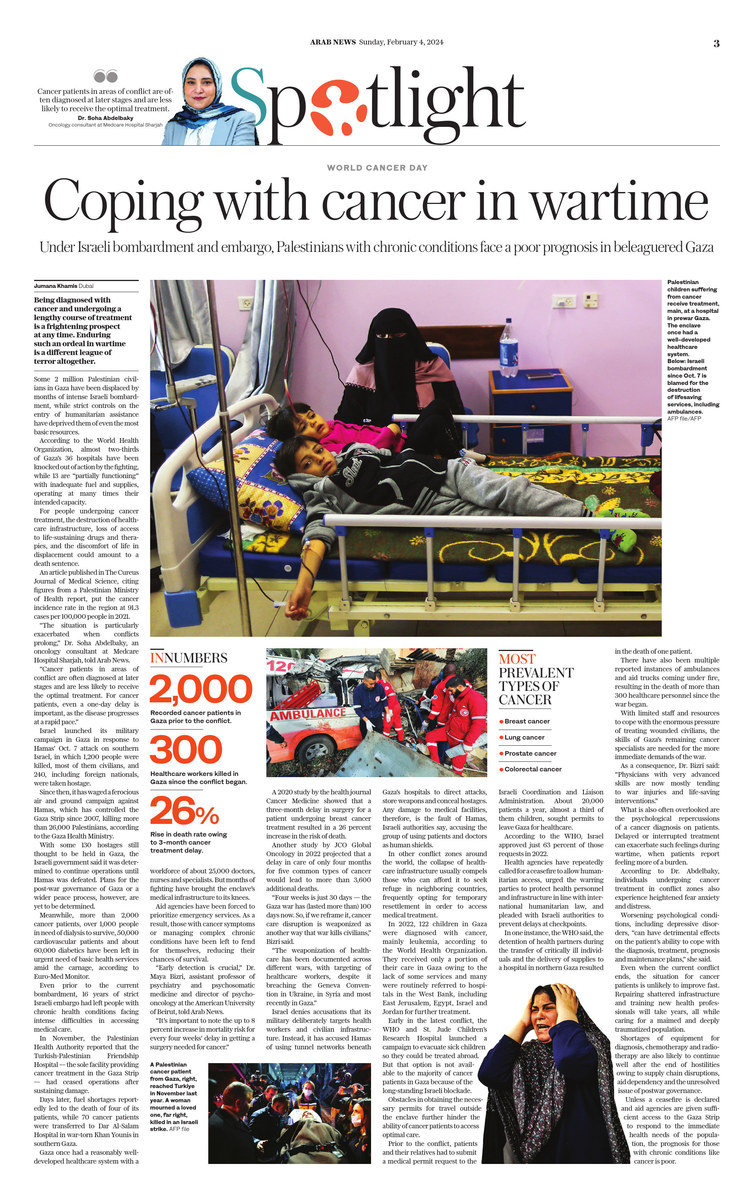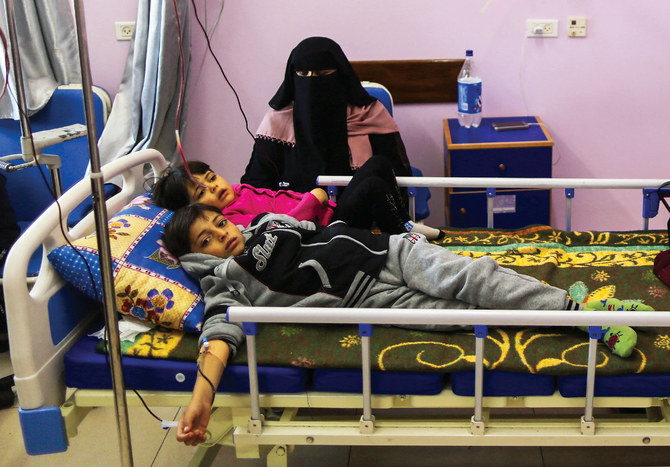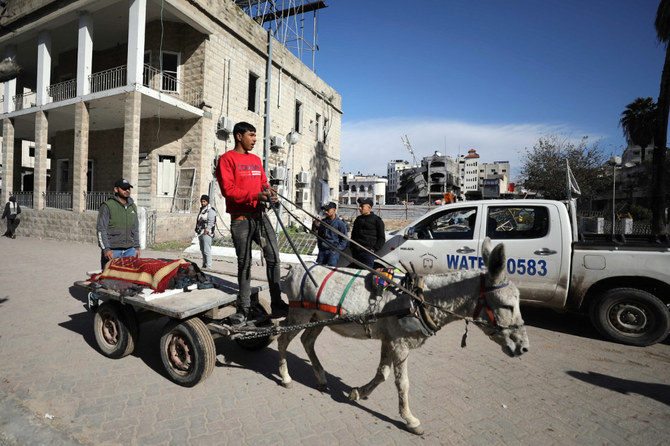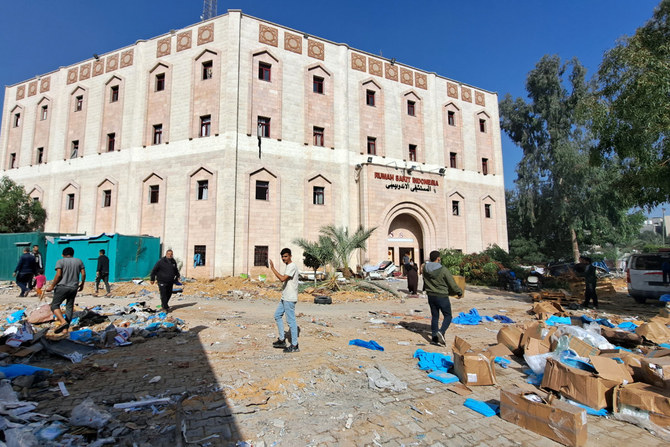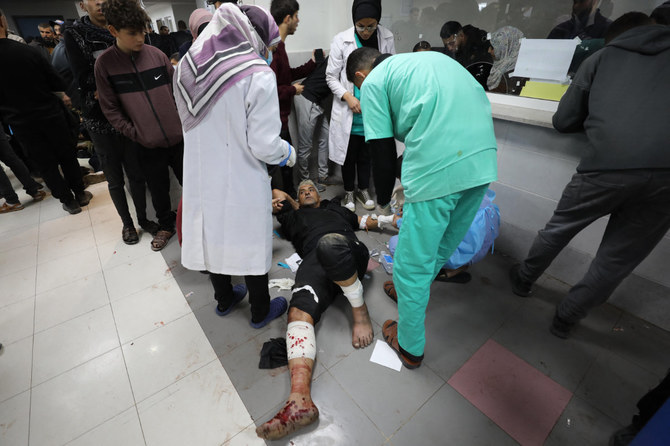DUBAI: Being diagnosed with cancer and undergoing a lengthy course of treatment is a frightening prospect at any time. Enduring such an ordeal in wartime is a different league of terror altogether.
Some 2 million Palestinian civilians in Gaza have been displaced by months of intense Israeli bombardment, while strict controls on the entry of humanitarian assistance have deprived them of even the most basic resources.
According to the World Health Organization, almost two-thirds of Gaza’s 36 hospitals have been knocked out of action by the fighting, while 13 are “partially functioning” with inadequate fuel and supplies, operating at many times their intended capacity.

Injured people receive treatment in Gaza City's Al-Shifa hospital following a reported Israeli strike that killed at least 20 and wounded more than 150 as they waited for treatment on January 25, 2024.(AFP)
For people undergoing cancer treatment, the destruction of healthcare infrastructure, loss of access to life-sustaining drugs and therapies, and the discomfort of life in displacement could amount to a death sentence.
An article published in The Cureus Journal of Medical Science, citing figures from a Palestinian Ministry of Health report, put the cancer incidence rate in the region at 91.3 cases per 100,000 people in 2021.
“The situation is particularly exacerbated when conflicts prolong,” Dr. Soha Abdelbaky, an oncology consultant at Medcare Hospital Sharjah, told Arab News.

Emergency workers bring a Palestinian man, who was released after being detained with other civilians for questioning by Israeli forces, waits at Al-Najjar Hospital in Rafah on Feb. 1, 2024. (AFP)
“Cancer patients in areas of conflict are often diagnosed at later stages and are less likely to receive the optimal treatment. For cancer patients, even a one-day delay is important, as the disease progresses at a rapid pace.”
Israel launched its military campaign in Gaza in response to Hamas’ Oct. 7 attack on southern Israel, in which 1,200 people were killed, most of them civilians, and 240, including foreign nationals, were taken hostage.
INNUMBERS
• 2,000 Recorded cancer patients in Gaza prior to conflict.
• 300 Healthcare workers killed in Gaza since conflict began.
• 26% Rise in death rate owing to 3-month cancer treatment delay.
Since then, it has waged a ferocious air and ground campaign against Hamas, which has controlled the Gaza Strip since 2007, killing more than 26,000 Palestinians, according to the Gaza Health Ministry.
With some 130 hostages still thought to be held in Gaza, the Israeli government said it was determined to continue operations until Hamas was defeated. Plans for the post-war governance of Gaza or a wider peace process, however, are yet to be determined.

Gaza once had a reasonably well-developed healthcare system with a workforce of about 25,000 doctors, nurses and specialists. (AFP)
Meanwhile, more than 2,000 cancer patients, over 1,000 people in need of dialysis to survive, 50,000 cardiovascular patients and about 60,000 diabetics have been left in urgent need of basic health services amid the carnage, according to Euro-Med Monitor.
Even prior to the current bombardment, 16 years of strict Israeli embargo had left people with chronic health conditions facing intense difficulties in accessing medical care.

This infographic was shared on social media by the Palestinian Ministry of Health three years ago. With the destruction of most of the hospitals in Gaza since October 7, 2023, the fate of many of the patients is uncertain.
In November, the Palestinian Health Authority reported that the Turkish-Palestinian Friendship Hospital — the sole facility providing cancer treatment in the Gaza Strip — had ceased operations after sustaining damage.
Days later, fuel shortages reportedly led to the death of four of its patients, while 70 cancer patients were transferred to Dar Al-Salam Hospital in war-torn Khan Younis in southern Gaza.

Palestinian cancer patients, who had crossed from Gaza into Egypt, arrived at the Esenboga Airport in Ankara on November 16, 2023. Two planes carrying more than two dozen Palestinian cancer patients, many of them children, arrived in Turkey for treatment in the early hours of November 16. (AFP)
Gaza once had a reasonably well-developed healthcare system with a workforce of about 25,000 doctors, nurses and specialists. But months of fighting have brought the enclave’s medical infrastructure to its knees.
Aid agencies have been forced to prioritize emergency services. As a result, those with cancer symptoms or managing complex chronic conditions have been left to fend for themselves, reducing their chances of survival.
“Early detection is crucial,” Dr. Maya Bizri, assistant professor of psychiatry and psychosomatic medicine and director of psycho-oncology at the American University of Beirut, told Arab News.
“It’s important to note the up to 8 percent increase in mortality risk for every four weeks’ delay in getting a surgery needed for cancer.”
MOST PREVALENT TYPES OF CANCER
Breast cancer:
• Estimated new cases in 2018: 119,985.
• Deaths in 2018: 48,661.
• Worldwide estimated cases in 2020: 2.3 million.
• Prevalence attributed to lifestyle, environmental changes among females.
Lung cancer:
• Leading cause of global cancer incidence and mortality.
• Estimated diagnoses: 2 million
• Reported deaths: 1.8 million
• Prevalence linked to increased tobacco access and industrialization.
Prostate cancer:
• Second most common solid tumor in men.
• Fifth leading cause of cancer mortality.
• Occurs due to age, family history, genetic mutations.
Colorectal cancer:
• Increasing incidence in Middle East, especially among under-50s.
A 2020 study by the health journal Cancer Medicine showed that a three-month delay in surgery for a patient undergoing breast cancer treatment resulted in a 26 percent increase in the risk of death.
Another study by JCO Global Oncology in 2022 projected that a delay in care of only four months for five common types of cancer would lead to more than 3,600 additional deaths.
“Four weeks is just 30 days — the Gaza war has (lasted more than) 100 days now. So, if we reframe it, cancer care disruption is weaponized as another way that war kills civilians,” Bizri said.
“The weaponization of healthcare has been documented across different wars, with targeting of healthcare workers, despite it breaching the Geneva Convention in Ukraine, in Syria and most recently in Gaza.”

This aerial view shows people standing before destroyed buildings at the site of the Ahli Arab hospital in central Gaza on October 18, 2023 in the aftermath of an overnight Israeli strike. (AFP)
Israel denies accusations that its military deliberately targets health workers and civilian infrastructure. Instead, it has accused Hamas of using tunnel networks beneath Gaza’s hospitals to direct attacks, store weapons and conceal hostages.
Any damage to medical facilities, therefore, is the fault of Hamas, Israeli authorities say, accusing the group of using patients and doctors as human shields.
In other conflict zones around the world, the collapse of healthcare infrastructure usually compels those who can afford it to seek refuge in neighboring countries, frequently opting for temporary resettlement in order to access medical treatment.

Israeli bombardment since Oct. 7 is blamed for the destruction of lifesaving services, including ambulances. (AFP)
In 2022, 122 children in Gaza were diagnosed with cancer, mainly leukemia, according to the World Health Organization. They received only a portion of their care in Gaza owing to the lack of some services and many were routinely referred to hospitals in the West Bank, including East Jerusalem, Egypt, Israel and Jordan for further treatment.
Early in the latest conflict, the WHO and St. Jude Children’s Research Hospital launched a campaign to evacuate sick children so they could be treated abroad. But that option is not available to the majority of cancer patients in Gaza because of the long-standing Israeli blockade.
Obstacles in obtaining the necessary permits for travel outside the enclave further hinder the ability of cancer patients to access optimal care.

Children wounded following Israeli bombardment awaits treatment at Nasser hospital in Khan Yunis in the southern Gaza Strip on December 20, 2023. (AFP)
Prior to the conflict, patients and their relatives had to submit a medical permit request to the Israeli Coordination and Liaison Administration. About 20,000 patients a year, almost a third of them children, sought permits to leave Gaza for healthcare.
According to the WHO, Israel approved just 63 percent of those requests in 2022.
Health agencies have repeatedly called for a ceasefire to allow humanitarian access, urged the warring parties to protect health personnel and infrastructure in line with international humanitarian law, and pleaded with Israeli authorities to prevent delays at checkpoints.

Emergency workers bring a Palestinian man, who was released after being detained with other civilians for questioning by Israeli forces, waits at Al-Najjar Hospital in Rafah on February 1, 2024. (AFP)
In one instance, the WHO said, the detention of health partners during the transfer of critically ill individuals and the delivery of supplies to a hospital in northern Gaza resulted in the death of one patient.
There have also been multiple reported instances of ambulances and aid trucks coming under fire, resulting in the death of more than 300 healthcare personnel since the war began.
With limited staff and resources to cope with the enormous pressure of treating wounded civilians, the skills of Gaza’s remaining cancer specialists are needed for the more immediate demands of the war.
As a consequence, Dr. Bizri said: “Physicians with very advanced skills are now mostly tending to war injuries and life-saving interventions.”

As a result of the war, many doctors in Gaza have been relegated to tend to wounded patients, being unable to practice their specializations. (AFP)
What is also often overlooked are the psychological repercussions of a cancer diagnosis on patients. Delayed or interrupted treatment can exacerbate such feelings during wartime, when patients report feeling more of a burden.
According to Dr. Abdelbaky, individuals undergoing cancer treatment in conflict zones also experience heightened fear anxiety and distress.
Worsening psychological conditions, including depressive disorders, “can have detrimental effects on the patient’s ability to cope with the diagnosis, treatment, prognosis and maintenance plans,” she said.

Repairing shattered infrastructure and training new health professionals will take years, all while caring for a maimed and deeply traumatized population. (AFP photo)
Even when the current conflict ends, the situation for cancer patients is unlikely to improve fast. Repairing shattered infrastructure and training new health professionals will take years, all while caring for a maimed and deeply traumatized population.
Shortages of equipment for diagnosis, chemotherapy and radiotherapy are also likely to continue well after the end of hostilities owing to supply chain disruptions, aid dependency and the unresolved issue of postwar governance.
Unless a ceasefire is declared and aid agencies are given sufficient access to the Gaza Strip to respond to the immediate health needs of the population, the prognosis for those with chronic conditions like cancer is poor.
